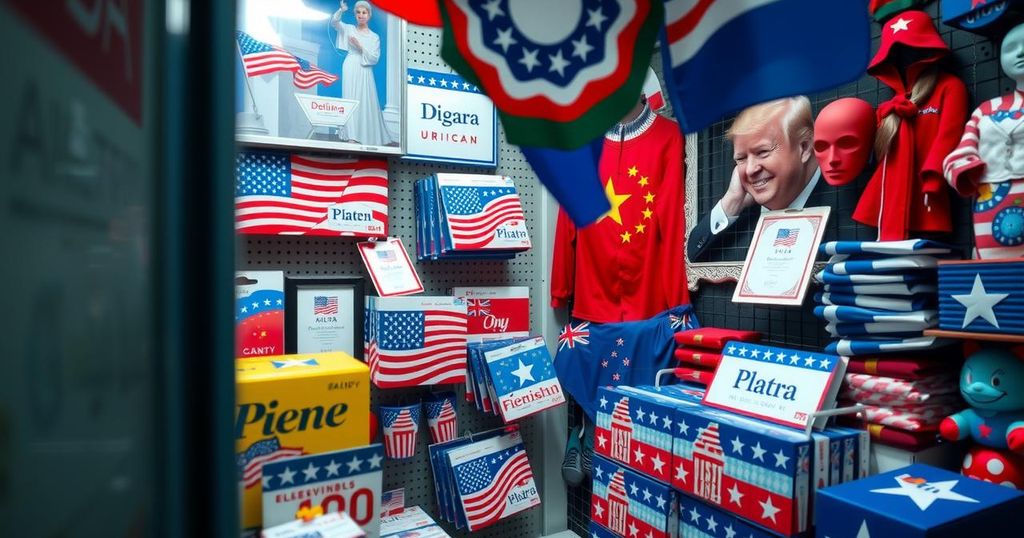The Impact of Chinese-Made Election Merchandise on U.S. Manufacturing

During the United States presidential election, voters are increasingly purchasing election merchandise, much of which is produced in China, leading to significant competitive challenges for American manufacturers. The prevalence of inexpensive foreign products, particularly on e-commerce platforms, underscores a larger issue regarding domestic manufacturing viability, exacerbated by the de minimis loophole that allows low-cost goods to enter the U.S. duty-free. Experts highlight the irony of supporting candidates advocating for domestic jobs while purchasing foreign-made merchandise.
As the United States presidential election moves into its concluding stages, voters are increasingly showcasing their support for candidates through election-related merchandise. However, many may not be aware that popular items, such as the “Make America Great Again” Trump hat or the “Childless Cat Lady for Harris” T-shirt, are often produced in China rather than domestically. Chinese traders have utilized e-commerce platforms to inundate the U.S. market with inexpensive election products, placing American manufacturers at a competitive disadvantage. Ben Waxman, the founder of American Roots, an American apparel company, expressed concern over this influx, stating, “I think the amount of stuff on Amazon and Etsy that’s coming from China… is drastically impacting American manufacturers’… ability to compete and grow our own business. I think it’s dramatic.” Waxman indicated that while his U.S.-made campaign T-shirts retail for approximately $15, similar items available from Chinese online retailers, such as Temu, can be purchased for as low as $3. He attributed the price differences to the costs associated with adhering to labor and environmental standards. Despite efforts to promote U.S. manufacturing, the prevalence of Chinese-made goods on marketplaces like Amazon and eBay highlights the challenges faced by American producers, including a notable disparity in pricing. For instance, a “Make America Great Again” hat costs around $4 on Temu, while its official counterpart on the Trump campaign’s website is priced at $40. Similarly, Kamala Harris hats are available on Temu for less than $3, compared to their official campaign store price of $47. Kim Glas, president and CEO of the National Council of Textile Organizations, cited rampant abuse of the de minimis loophole, which permits low-value goods to enter the U.S. without paying import duties, leading to significant losses for American manufacturers. She reported that the NCTO has seen 21 manufacturing operations close in the past 18 months, with campaign-related product sales slower than in any previous election cycle. Despite the criticism, e-commerce platforms continue to thrive, with Temu claiming its growth stems from operational efficiencies rather than the de minimis policy. Mitch Cahn, president of Unionwear, noted the irony of American consumers supporting candidates advocating for domestic manufacturing while often resorting to foreign-made products. Cahn remarked, “If someone is supporting a candidate because of that candidate’s economic policy… and then they’re supporting a candidate by buying a product that’s made in a country that stands for the opposite… they’re actually doing themselves and the candidate and the economy a disservice.” The expansion of Chinese production is also evident in the realm of widely popular items, such as bibles, with reports indicating that many of the “God Bless America” Bibles, associated with Donald Trump, were printed in China. Critics have suggested that such revelations may undermine candidates’ narratives on supporting American jobs, raising questions regarding the potential impact on undecided voters. Moreover, experts like Chris Tang from UCLA emphasize that the presence of inexpensive Chinese merchandise creates both challenges and opportunities for American businesses. While some manufacturing jobs may diminish, others can arise as small businesses leverage platforms to quickly import products. Tang argues that America should focus on developing a manufacturing sector centered around higher-value goods rather than inexpensive election-themed items.
The emergence of e-commerce platforms has dramatically reshaped how election merchandise is marketed and sold in the United States. As voters engage more actively in the political process, they often seek affordable means to express their preferences, leading to an increase in imported products. Chinese manufacturers have capitalized on this trend, leveraging low production costs to provide competitive pricing that significantly undercuts American producers, raising concerns about the viability of domestic manufacturing in this sector. The de minimis loophole presents an additional challenge, permitting inexpensive Chinese goods to enter the U.S. duty-free, further exacerbating the difficulties faced by American small businesses in maintaining their market share.
The influx of China-made election merchandise significantly affects U.S. manufacturers’ ability to compete, posing challenges for local businesses and creating a discrepancy in pricing between domestic and foreign products. While some consumers benefit from lower prices, the economic implications for the American manufacturing sector are severe, with job losses and operational closures becoming increasingly common. As the election approaches, it is increasingly evident that the intersection of political support and purchasing behaviors complicates the narrative surrounding domestic production and economic advocacy.
Original Source: www.voanews.com







